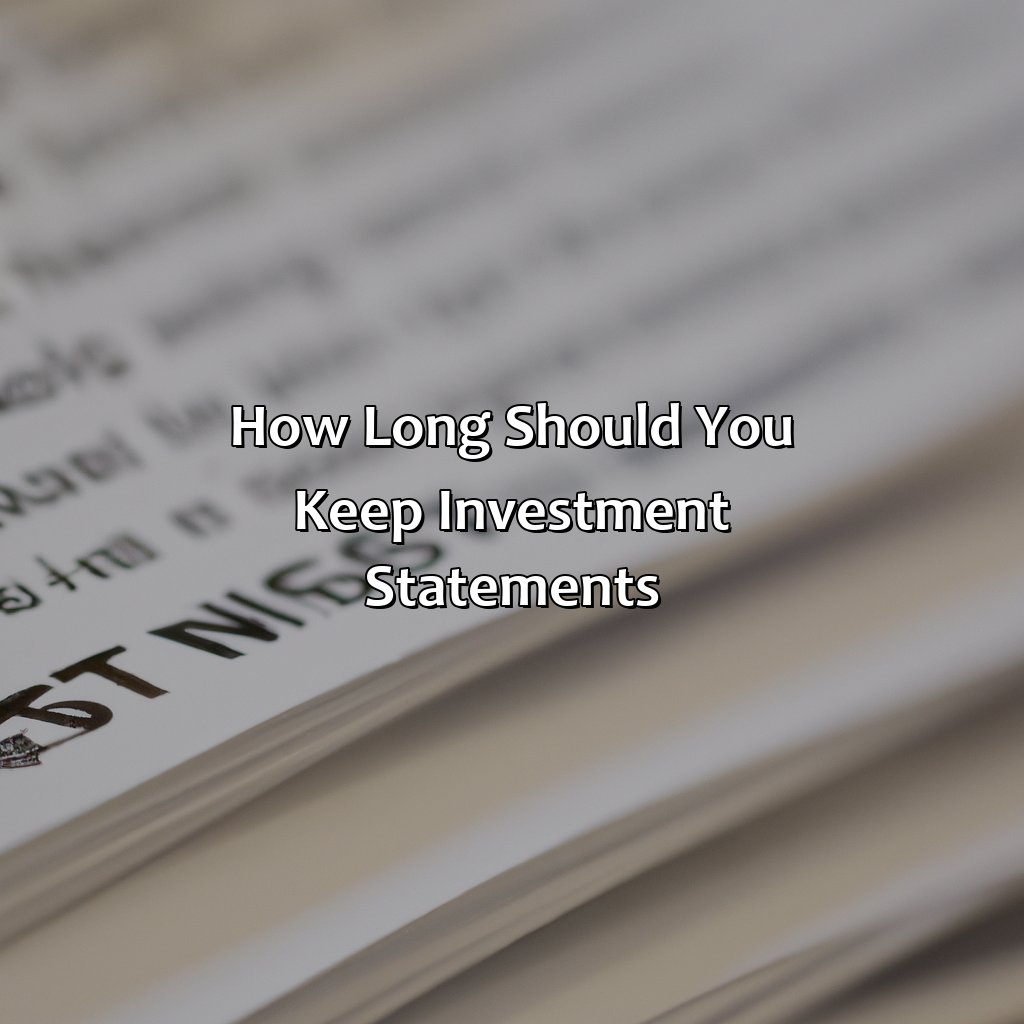How Long Should You Keep Investment Statements?
Key Takeaways:
- Investment statements are important documents that can provide evidence of your financial transactions over time, so it is important to keep them for a certain period.
- Ordinary statements can be kept for one year, while annual tax statements and receipts should be kept for seven years to comply with tax regulations and to ensure you have a record of your investment returns.
- Investment property statements should be kept indefinitely, as they are necessary for calculating capital gains and other financial obligations related to the property.
- Digital investment statements should be kept for the same amount of time as their paper counterparts and should be stored in a safe and secure location to prevent unauthorized access.
- It is important to safely store and dispose of investment statements to prevent identity theft or other financial frauds. Proper shredding is recommended to ensure sensitive information is destroyed completely.
Are you unsure of how long you should keep your investment statements? Learn the answer to this important question and how it can help you manage your finances. You’ll be prepared for any financial situation with the right strategy!
Importance of investment statements
Investment statements are crucial for tracking your financial progress and managing your investment portfolio. These statements serve as a record of your investment holdings, transactions, and returns. Reviewing your investment statements regularly ensures that your investments are performing as per your investment goals and risk tolerance. Additionally, it helps you detect any discrepancies or errors in your account and take corrective action.
Keeping investment statements is essential for future reference or filing tax returns accurately.
It is recommended to keep your investment statements for at least seven years. You may require them for claiming deductions, filing tax returns, or verifying your account history. Electronic copies of investment statements can be saved for convenience and backed up for security. Keeping them organized and up-to-date can save you time and effort in the future.
One investor, Mr. James, found out that he had lost his old investment statements after a year. When he wanted to review them, he could not locate them, and his brokerage firm had no records of his transactions. It cost him a lot of time and money to restore this information, and some transactions became untraceable. Therefore, it is crucial to store old investment statements in banks, electronic devices, or cloud storage with proper security measures to prevent loss or theft.
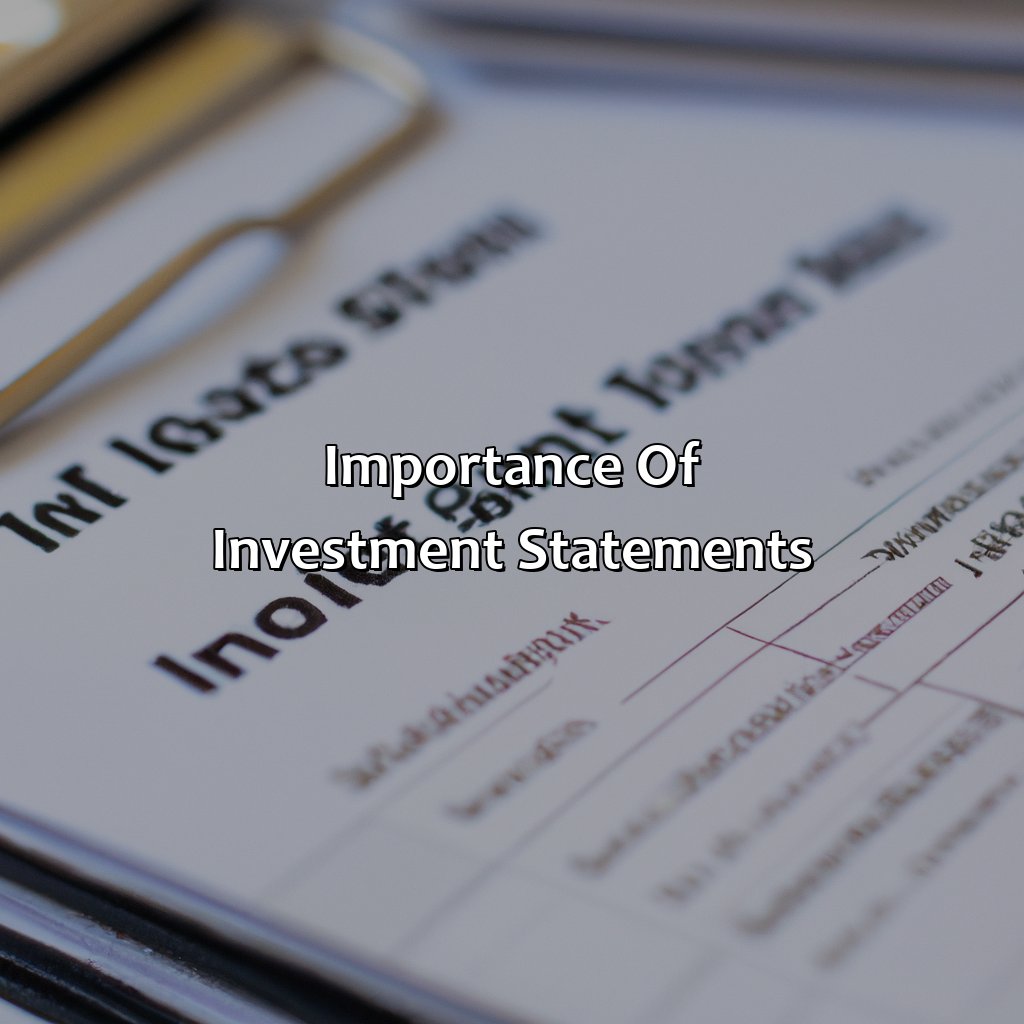
Image credits: retiregenz.com by Joel Jones
How long to keep paper investment statements
Investment statements are critical documents for investors. Knowing how long to keep paper investment statements is crucial for maintaining financial records. It is recommended to keep them for a period of seven years to avoid any discrepancies in tax filings or investment claims. Keeping them electronically, in a secure and easily accessible location, is a viable alternative.
In addition to tax and investment purposes, keeping investment statements for the long term helps in auditing, estate planning, and inheritance purposes. Having these statements on hand can assist in making informed decisions and prevent any misunderstandings or disputes.
Investors have shared real-life incidents where they found themselves in a difficult situation for not keeping their investment statements. One investor lost significant savings because they could not provide proof of an investment they had made several years ago, and the company no longer existed. Therefore, it is always better to err on the side of caution and hold onto investment statements for as long as possible.
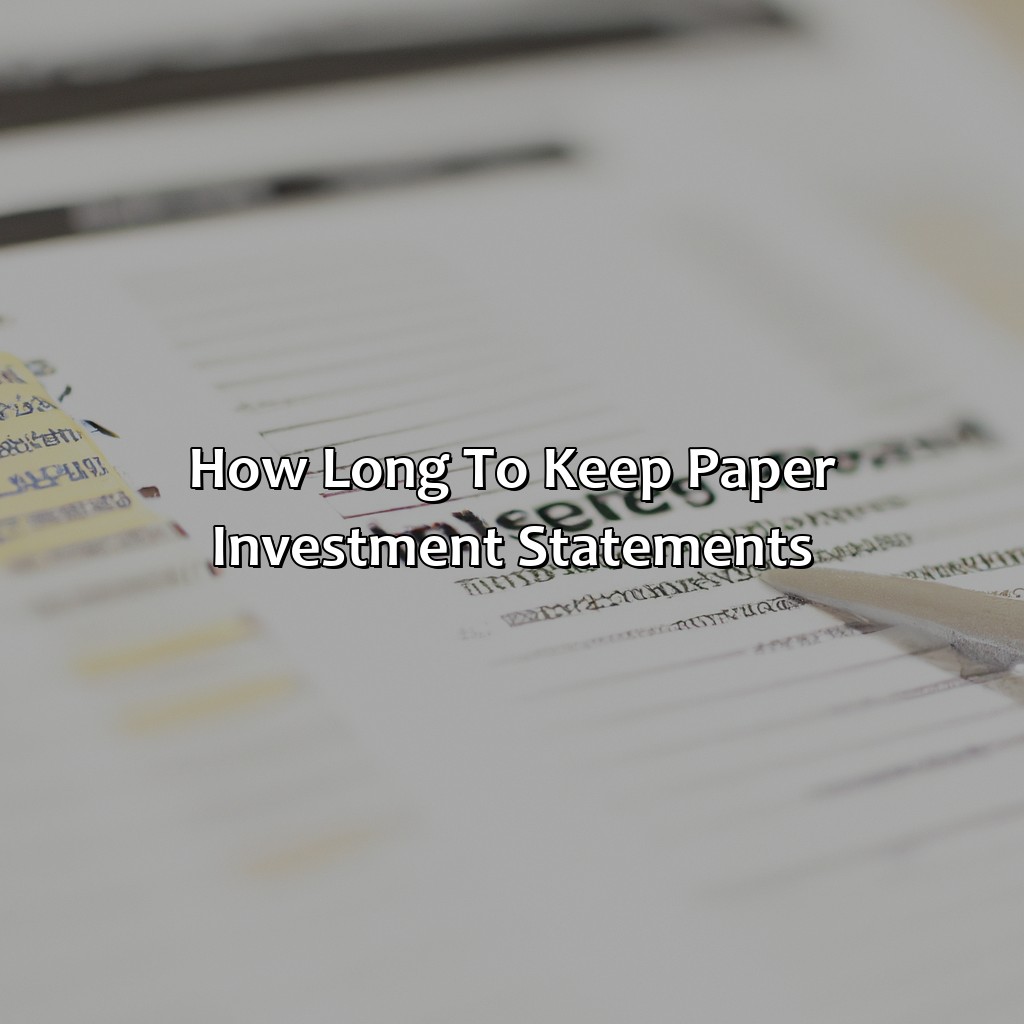
Image credits: retiregenz.com by Harry Jones
One year rule for ordinary statements
Keeping investment statements is essential for financial planning. The recommended time for retaining ordinary statements varies, but a common rule is to keep them for at least one year. During this period, you can reconcile transactions and report any discrepancies to your broker or bank.
It’s important to note that some institutions may request you to retain documents for longer durations than one year. Additionally, if the statement pertains to a security sale, you’ll need to keep it until the capital gain or loss has been reported on your tax returns.
While keeping paper investment statements might seem outdated, they’re still crucial for auditing purposes and tracking the overall performance of your investments over time. Suppose you experience digital issues such as system crashes or hacking attempts- having hard copies of your statements can offer a backup plan.
A friend of mine once lost all her online banking records due to a virus attack on her computer. While the institution could reproduce some documents, others were irrecoverable since they were beyond their retention period. She ended up spending more money trying to recoup lost data than she would have by merely printing out financial records from previous years.
Looks like your annual tax statements have a shorter lifespan than a goldfish, better make sure they don’t end up swimming with the fishes!
Seven years for annual tax statements and receipts
Investment statements should be kept for a period of seven years, particularly for annual tax purposes. This duration is essential to comply with legal tax laws and regulations, ensuring that you have sufficient records available if requested by the relevant authorities. Ensuring that your investments are well documented can avoid complications or misunderstandings with your taxes in the future.
In terms of record-keeping, it is suggested to keep paper statements or electronic records beyond the minimum seven-year requirement. This way, you can track the progress of your investments over time and make well-informed decisions when you need to sell or buy investments. Additionally, holding on to these documents may be useful in situations such as estate planning or auditing purposes.
While investment statements specifically concerning taxation fall under the retention period mentioned above, other documents related to investments, such as brokerage account summaries or trade confirmations, should also be retained for an extended period. Keeping such documents for a long time will ensure that your investment history remains accessible and comprehensible at all times.
It is wise to store investment statements and related documents in an organized manner where they can be easily found and retrieved if needed. It may be helpful to create digital backups on secure cloud storage platforms or external drives alongside retaining physical copies.
Overall, it’s crucial to retain all relevant investment documentation properly. Doing so enables transparency and clarity into complex financial activities while ensuring compliance with legal regulations and securing favorable use cases from investors’ archives when global matters demand history-seeking decision-making processes at scale by individuals who bring Data Science expertise along-side good judgment calls. Your investment property statement is like a bad ex, you never know when they’ll come back to haunt you – so keep it indefinitely.
Indefinitely for investment property statements
Investment property statements should be retained indefinitely. It is necessary to hold onto these records for the purpose of tax documentation, evaluation of asset value, and financial planning.
The following table provides an outline of important details to retain in investment property statements:
| Investment Property Statements | |
|---|---|
| Acquisition Date | Purchase price |
| Sale Date | Selling price |
| Holding period | Depreciation records |
| Rental income | Mortgage statements |
It is essential to keep all of this information in a secure location to avoid losing it. This will assist in developing thorough and informed financial plans for your future.
When it comes to property investments, maintaining accurate records can also be helpful when making decisions about selling or retaining properties. Analyzing trends from previous investments can provide insights into current markets.
A friend once failed to keep track of their investment property records. As a result, they missed out on a valuable tax deduction that could have saved them thousands of dollars. Retaining these records indefinitely provides peace of mind and eliminates any surprises in the future.
Digital investment statements: the only time you’ll be happy to see your inbox cluttered.
Digital investment statements
Organizing and keeping digital investment statements is important. We’ll discuss this in the section, “Digital Investment Statements.” And in the sub-section, “How Long to Keep Digital Statements,” we’ll cover the recommended duration. This is key, due to the shift to paperless solutions.
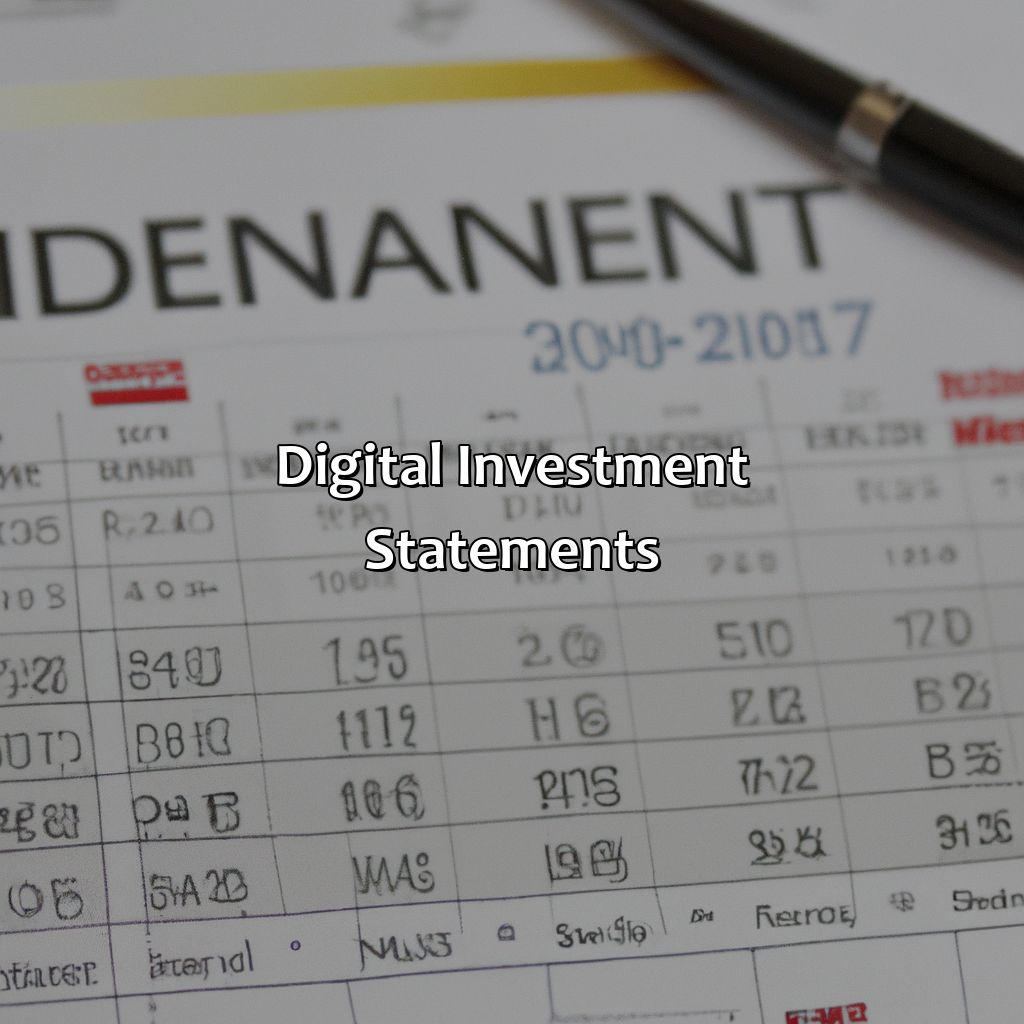
Image credits: retiregenz.com by Yuval Washington
How long to keep digital statements
Once you receive your digital investment statements, the question that arises is for how long should you keep them. These digital records need to be retained for a certain time period to ensure that they are readily available in case of any legal or taxation concerns.
It is recommended to retain digital investment statements for a minimum of seven years. This duration ensures compliance with legal and regulatory requirements. Moreover, some events like divorce settlements, potential lawsuits, or filing tax returns can require you to submit relevant documents from up to five years ago.
Apart from the regulations, keeping digital investment statements serves as proof of ownership, acts as an essential reference in documenting investment history and assists in assessing portfolio performance over time.
Failing retaining these documents might lead to unintentional omissions or inaccurate data and could result in higher taxes or penalties.
Therefore, it is crucial to keep your digital investment statements safe and secure while ensuring that backup copies are taken regularly. While seven years may seem like a long time, it’s always better to be safe than sorry.
Keeping your investment statements safe is like keeping your ex’s love letters – you never know when you might need them as evidence.
Safekeeping investment statements
Investment Statement Retention: How Long to Keep Them
Wondering how long you should keep your investment statements? The answer is not straightforward. While some documents may be discarded after a few years, others may need to be retained indefinitely.
Generally, investment statements should be kept for at least three years, as this is the standard limitation period. However, if the statement relates to a transaction that has tax implications, it should be kept for at least six years from the end of the relevant tax year. It’s also important to retain statements that contain information about long-term investments, such as property, shares, or bonds for as long as you hold the investment.
In addition, it’s important to maintain accurate records of all investment-related transactions. A friend of mine who sold some shares several years ago and threw away the related investment statements later learned that he needed one of those statements for a tax audit. Unfortunately, he couldn’t recover the statement, resulting in a stressful and expensive situation.
As a general rule of thumb, it’s better to err on the side of caution and keep your investment statements longer than necessary. Maintaining accurate records can save you from needless stress and expenses in the future.
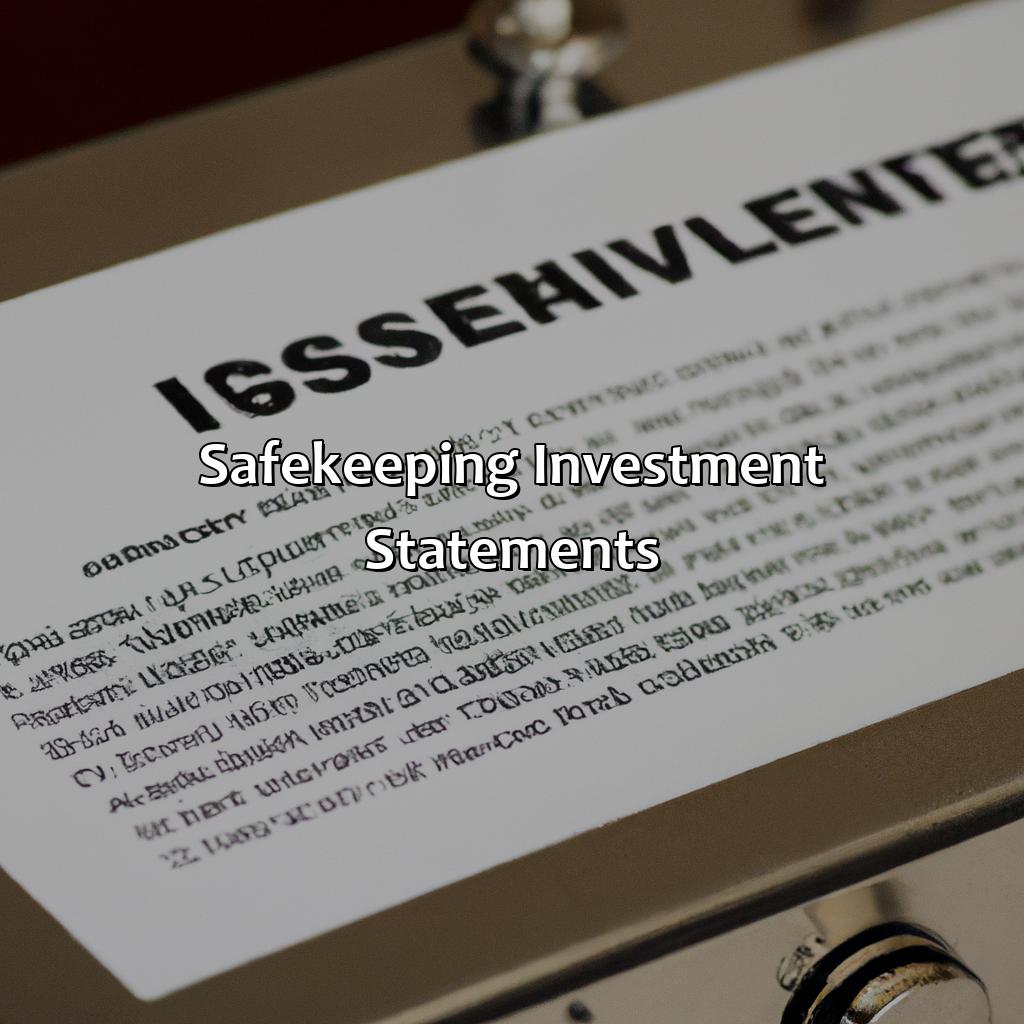
Image credits: retiregenz.com by James Woodhock
Importance of shredding investment statements properly
Investment statement shredding is vital for safeguarding confidential financial information. It prevents identity theft and fraud, which can damage credit and lead to financial loss. Once investment statements are no longer required for tax or legal purposes, they should be securely shredded. Maintaining proper disposal procedures is essential to protect oneself from financial crime and fraud.
It is important to note that even after shredding, investment statements can still be at risk of exploitation. Therefore, it is crucial to store investment statements in a secure location prior to shredding. For example, a locked filing cabinet or a password-protected electronic storage device would be sufficient storage options. Proper shredding methods include cross-cut or confetti-cut shredders, which produce smaller pieces than traditional strip-cut shredders.
According to a report by the Federal Trade Commission, identity theft and fraud affected 13% of American consumers in 2019. Proper investment statement shredding is a simple preventative measure that can protect against the potential financial devastation that can result from these crimes.
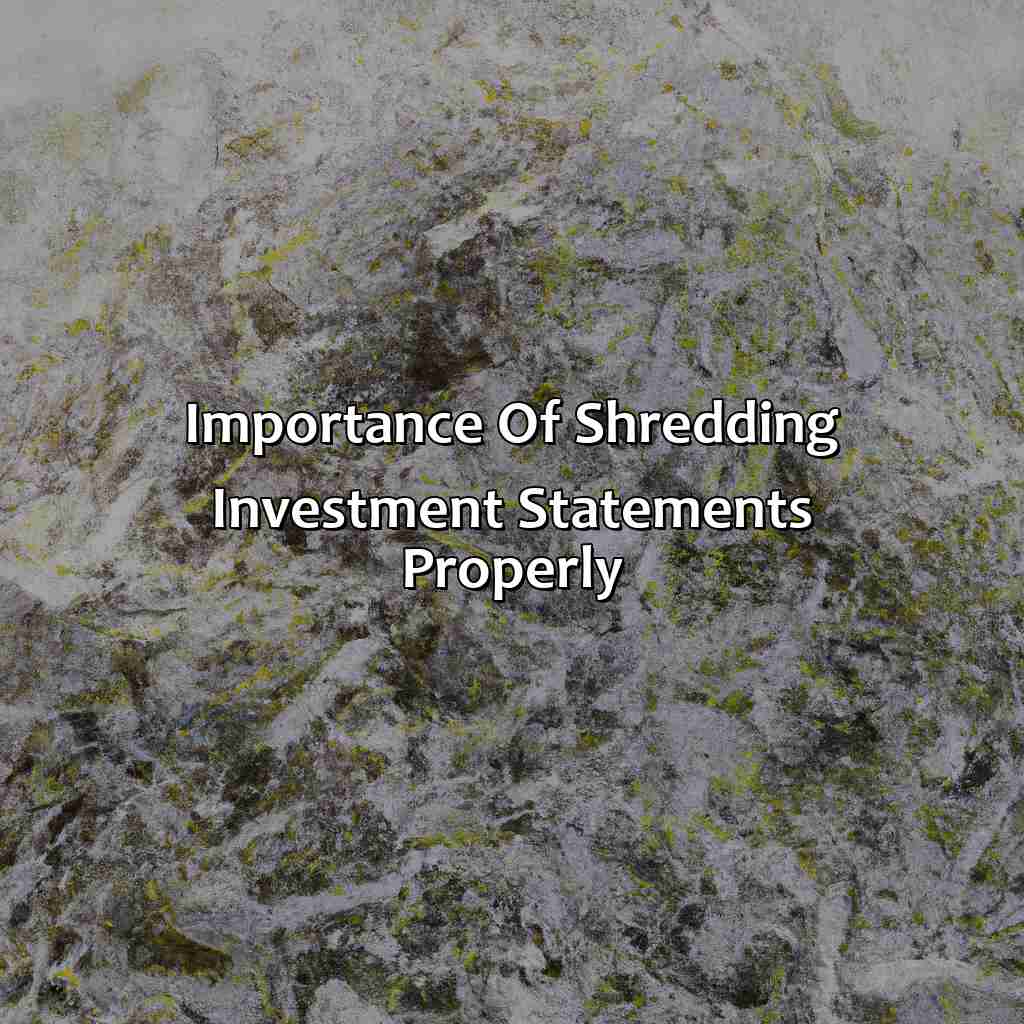
Image credits: retiregenz.com by James Duncun
Five Facts About How Long Should You Keep Investment Statements:
- ✅ Most financial experts recommend keeping investment statements for at least 7 years. (Source: NerdWallet)
- ✅ Keeping investment statements can help with tax returns, audits, and tracking your financial progress over time. (Source: The Balance)
- ✅ Some investment companies may charge fees for retrieving past statements, so keeping them on hand can save money in the long run. (Source: Investopedia)
- ✅ In some cases, it may be necessary to keep investment statements indefinitely, such as for estate planning or legal purposes. (Source: Fidelity)
- ✅ While paper statements take up physical space, keeping electronic copies can provide convenient and secure access to your investment history. (Source: The Street)
FAQs about How Long Should You Keep Investment Statements?
How long should you keep investment statements?
Investment statements are important documents that show your investment transactions and balances. You may need to keep them for a certain period of time for various reasons, such as tax purposes or record-keeping. Here are the answers to some common questions regarding how long you should keep investment statements.
1. How long should you keep investment statements for tax purposes?
You should keep your investment statements for at least three years from the date you filed your tax return or two years from the date you paid the tax, whichever is later. This is because the IRS has up to three years to audit your tax returns and you need the necessary documents to support your deductions and credits.
2. How long should you keep investment statements for record-keeping?
You should keep your investment statements for as long as you hold the investment, and for a few years after you sell it. This will help you track the performance of your investments and determine your gains and losses when you sell them.
3. Should you keep physical copies or electronic copies of investment statements?
You can keep either physical copies or electronic copies of your investment statements, as long as they are accurate, legible, and accessible. However, electronic copies are more convenient and easier to organize.
4. What are the consequences of not keeping investment statements?
If you do not keep your investment statements, you may have difficulty proving your investment gains or losses, which can result in errors in your tax returns and penalties from the IRS. You may also miss out on important information about your investments, such as dividends or capital gains distributions.
5. How should you dispose of old investment statements?
You should shred or destroy your old investment statements before disposing of them to prevent identity theft and fraud. You can also ask your financial institution if they have a secure disposal method for your statements.
6. Can you request old investment statements from your financial institution?
Yes, you can request old investment statements from your financial institution if you need them for tax purposes or record-keeping. However, some institutions may charge a fee for this service.
